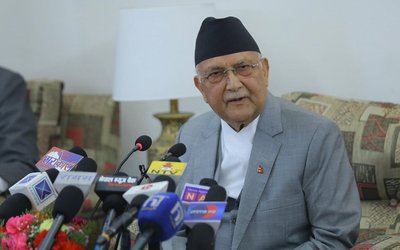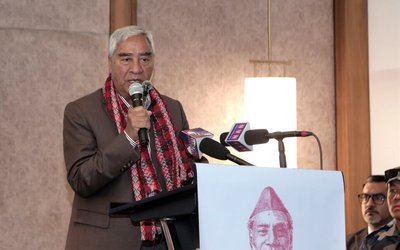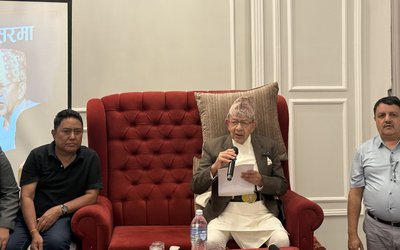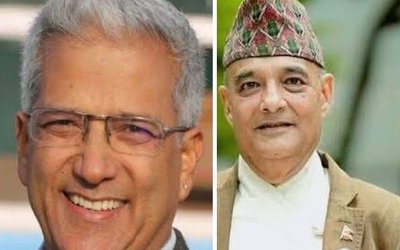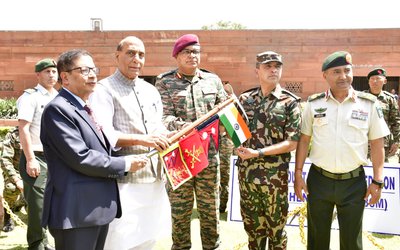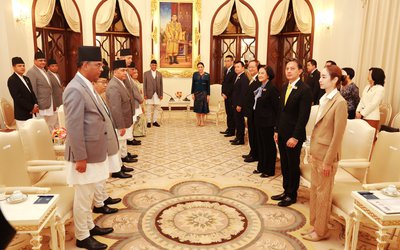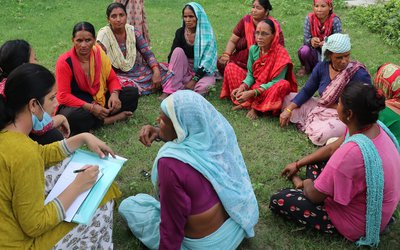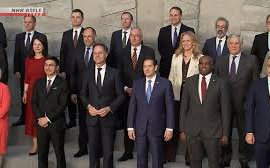
Although Nepal is holding an international meet, the Fifth South Asian Conference on Sanitation (SACOSAN), in October with a slogan seeking access to sanitation for all in South Asia, Nepal's own state in the coverage of sanitation is bleak. At the initiative of 13 different organizations, along with WaterAid-Nepal, a petition was handed over to the chairman of council of ministers calling for universal access to water and sanitation.
The organizations, WaterAid Nepal together with FEDWASUN , CIUD , ENPHO , FAN , FEDO , Guthi, KIRDARC , Kathmandu School of Law, Lumanti, Maitri, NEWAH , Standard Chartered Bank, and UEMS went to chairman Regmi and handed in more than 19,000 signatures in a petition calling on decision-makers to keep their promises on water and sanitation.
The petition, part of an international campaign with global CSO coalition End Water Poverty, will now be taken to the United Nations General Assembly Millennium Development Goal Review Summit, in New York, where it will be submitted as part of one million-strong global petition.
Chairman Khil Raj Regmi who attended UN summit as the leader of the Nepal Government delegation assured the delegation that he would take the issue of water and sanitation at the UN General Assembly.
Though data indicate Nepal has met MDG target on water and sanitation, only 50% of the water supply schemes are functional and sustainability of the sanitation practices and behaviour are still questionable. The current 62 % coverage on sanitation and 82% coverage on drinking water at the constraint of functionability and sustainability cannot ensure the commitment of Nepal Government for the universal coverage of water and sanitation for all by 2017.
The MDG target on sanitation in many countries will not be met and is currently the most off-track MDG target. Some 40% of the world lacks access to sanitation – more people have a mobile phone than have a toilet. The MDG target on water has been achieved at a global level, but at current rates of progress it will take 200 years to reach it in sub-Saharan Africa, while almost 800 million people across the world remain without access to an improved water source.
WaterAid Nepal Country Rrepresentative, Ashutosh Tiwari said: “The signatures collected for this petition show the strong demand from people in our country and across the world for decision makers to achieve universal access to safe water and sanitation, both here in Nepal and globally.
We are happy to know that the Chairman promised he will do his utmost to ensure WASH remains at the top of the political agenda”. WaterAid Nepal and these 13 organizations have been collecting signatures across the country as part of the Keep Your Promises campaign, focused on achieving universal access to water and sanitation.
WaterAid is an active member of the international Keep Your Promises campaign. Over the past year, it has joined civil society organisations across the world in collecting the astonishing 1 million signatures which call on decision makers to: set up efforts towards reaching the Millennium Development Goal (MDG) on sanitation; to ensure there is a commitment to universal access to water and sanitation in the post-2015 framework, and; to work towards achieving safe sanitation and drinking water for all.
Access to water, sanitation and hygiene (WASH) is crucial to ending poverty. WASH has impact on improving economic growth, health, gender equality and education. The studies have shown that improvement in the coverage in water and sanitation can have impact on infant mortality and health.
The benefits of investing in water and sanitation have been demonstrated to far outweigh the costs. It is estimated that to reach the sanitation MDG target by 2015 it will require $32.2 billion per year investment from 2010 to 2015. However, the total losses due to inadequate water supply/sanitation services are $260 billion per year, while there is a $4 return on every $1 invested in water and sanitation.
Although Nepal government has been expressing commitment to increase investment in water and sanitation, the budget in sanitation is still negligible and most of the budget is spent to increase access to drinking water. "We are committed, in fact doing more to fulfill the promises made. Nepal Government welcomes your support towards reaching WASH goals and acknowledge your effort in WASH,” said Regmi.
SACOSAN V
At a time when the date for fifth South Asian Conference on Sanitation (SACOSAN) is coming closer, there is an urgency for Nepal to take certain actions. As per the government statistics, Nepal has 50 percent population within reach to sanitation and the target is to reach cent percent by 2017.
Although Nepal has been taking the initiatives to end open defecation, there are around 700 million South Asians who still defecate in the open. At SACOSAN-IV held in April 2011 in Sri Lanka, South Asian ministers promised to set up a national body in each country to “coordinate sanitation and hygiene, involving all stakeholders”.
"Nepal is well-prepared to host the South Asian Conference on Sanitation (SACOSAN) scheduled to be held from October 22 to 24," said Kishore Thapa, secretary at the Ministry of Urban Development. "Discussions would cover eight themes such as sanitation and health, community-wide sanitation and sustainability, school sanitation, sanitation technology and marketing."
"Though data indicates Nepal has met Millennium Development Goal target on water and sanitation, only 50 percent of the water supply schemes are functional and sustainability of the sanitation practices and behavior are still not satisfactory to ensure public health. In such a situation, the regional conference would be a milestone for the entire WASH sector, said Awadh Kishor Mishra, joint secretary of the MoUD.
- IME GROUP: Expands Into Paper Industry
- Mar 24, 2025
- CPN UML: Instigated By India
- Mar 23, 2025
- ADB’S CHIEF ECONOMIST: Nepal Reduces Poverty
- Mar 11, 2025
- FM DR. DEUBA: A Successful Visit
- Mar 11, 2025
- MD GHISING: Target Of Personal Grudge
- Mar 09, 2025
